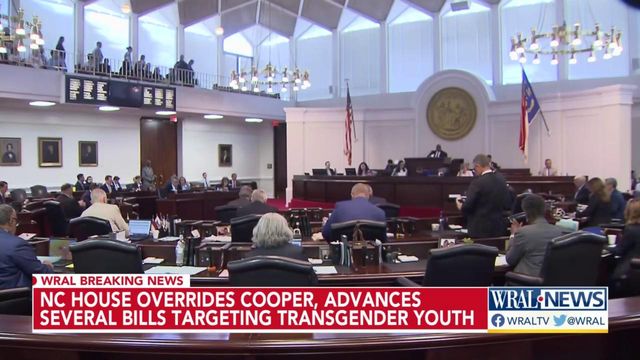New NC laws will target transgender youth and loosen charter school laws, as lawmakers override Cooper's vetoes
Half a dozen new North Carolina laws to loosen charter school regulations, and restrict the care and athletic activity of transgender youth, passed on Wednesday. Tension ran high during the emotional debates.
"We're not filth," yelled a protester in the audience, who was escorted out by police as the state Senate was debating a bill to ban transgender children from receiving various types of medical care. Her comment appeared to be aimed at Republican Lt. Gov. Mark Robinson, who was presiding over the Senate session and has called LGBTQ people "filth" in the past.
"This may be the most heartbreaking bill in a truly heartbreaking session," Sen. Lisa Grafstein, D-Wake, said of the ban on gender-affirming care. "This bill tells parents how to raise their kids. It injects raw politics into these intimate, personal and family medical decisions."
Both chambers of the GOP-led state legislature on Wednesday voted to override a handful of bills that have been vetoed by Democratic Gov. Roy Cooper. They immediately became law once the final votes were tallied.
The new laws are:
- Senate Bill 49, known as the Parents Bill of Rights, which would require teachers to out transgender children to their parents and would also ban elementary schools from having curricula, or books in the library, dealing with LGBTQ issues or other content addressing sexuality.
- House Bill 574, known as the Fairness in Women’s Sports Act, which would ban transgender girls and women from competing in women's sports in middle school, high school and college athletics in North Carolina.
- House Bill 808, which would prohibit medical professionals from providing gender-affirming medical care to any transgender patient under 18, including hormone treatments or puberty blockers as well as surgical procedures.
- House Bill 219, known as the Charter School Omnibus bill, which would expand enrollment rules for charters and allow county governments to use property tax revenue to pay for charter school buildings and other capital projects.
- House Bill 618, which would create a new board to vet and grant charter school applications and would scrap the current review process that goes through the State Board of Education.
- House Bill 488, which would divide the state’s current Building Code Council into two bodies, one focused on residential buildings and the other on commercial. It would also ban the council from updating the current building code and adding new energy efficiency rules, and allow the builders of multifamily units to use less fire-proofing between dwellings.
Sen. Amy Galey, R-Alamance, is lead sponsor of the Parents' Bill of Rights and defended the requirement to force teachers into outing transgender kids. She said the most important part of the bill is the sentence stating "parents have the right to direct the upbringing and moral or religious training of his or her child."
Democrats criticized the bill as catering to an extremist minority of parents who want to ban books and demean LGBTQ people. Sen. Natasha Marcus said whenever she hears from parents it's not about wanting to ban the discussion of LGBTQ topics but rather passing gun control laws or providing funding more school psychologists, nurses and other support staff. "I urge you to stand up for public education, for equality, and to vote no," Marcus said.
But Galey said elementary schools don't need to be focusing on topics of sexuality either gay or straight: "Instead of bringing complicated adult topics into the elementary school classroom, public schools must work on appropriate developmental milestones," she said.
The votes in the Senate were entirely along party lines, although in the House a few of the more moderate Democrats broke with their party and voted with Republicans on the veto overrides.
Cooper released a statement in response to the override votes.
"The legislature finally comes back to pass legislation that discriminates, makes housing less safe, blocks FEMA disaster recovery funding, hurts the freedom to vote and damages our economy," Cooper said in a statement. "Yet they still won’t pass a budget when teachers, school bus drivers and Medicaid Expansion for thousands of working people getting kicked off their health plans every week are desperately needed. These are the wrong priorities, especially when they should be working nights and weekends if necessary to get a budget passed by the end of the month."
Emotions run high
The bills affecting transgender minors and athletes generated the most impassioned feedback — both in an out of the legislative chamber. Prior to the votes Wednesday, supporters and opponents held separate rallies outside of the capitol building.
Supporters of the Fairness in Women’s Sports Act say it's needed to protect young women. They've argued that allowing transgender female athletes to compete against athletes who were born female is unfair, because transgender women are bigger and stronger and faster.
"So-called feminists will tell you that in order to have full equality, women need to sacrifice the spaces they fought so hard to secure. That is unequivocally false," state Sen. Vickie Sawyer said in a statement after the vote. "Our daughters should not be forced to compete against biological men."
In the other chamber, state Rep. Marcia Morey, D-Durham, argued that the bill is “mean-spirited” and unnecessary because it targets athletes who are amateurs — not professionals. Only two transgender girls have even sought permission to compete in high school athletics in North Carolina.
“We’re talking about kids in middle school, high school, who (are trying) to find their identity, their reason to belong,” Morey said.
Charter school help
Supporters of charter schools said the bills enacted Wednesday would grant parents more freedom in choosing their child’s education.
In addition to allowing charters to access more taxpayer dollars, House Bill 219 would allow them to expand without permission as long as they’re not low-performing. It would also allow charters to give preferential treatment to some applicants and enroll and charge tuition for out-of-state students.
Creating a new charter school review board, as House Bill 618 does, would make the school approval process more efficient, said state Rep. Tricia Cotham, R-Mecklenburg.
“The most important thing that this bill does is it puts kids first,” Cotham said. “It ensures that the outdated concept of one-size-fits-all in education is not the case in North Carolina.”
The new review board will mostly be appointed by Republican lawmakers — and altogether the bill “attempts to fix something that is not broken,” said state Rep. Lindsey Prather, D-Buncombe.
Accusations of hypocrisy
House members discussed the ban on gender-affirming care for minors immediately after passing Cotham’s charter school bill. And Democrats used her comments to argue that the GOP supermajority's efforts are ideologically inconsistent.
"My head is spinning because we want Parents’ Bill of Rights … unless they're seeking gender affirming care for their children who are in great need of that care. Amazing,” said state Rep. John Autry, D-Mecklenburg.
State Rep. Hugh Blackwell, R-Burke, argued that lawmakers across the nation have a long history of taking “extra steps to protect the interest of minors.”
State Rep. Deb Butler, D-New Hanover, singled out Cotham while criticizing the bill.
“We have a hypocrisy on our hands because, as Rep. Cotham says, parents do want options for their children,” Butler said. “If we really do believe that parents are the best arbiter and the best people to make decisions for their children, we wouldn’t do this."











